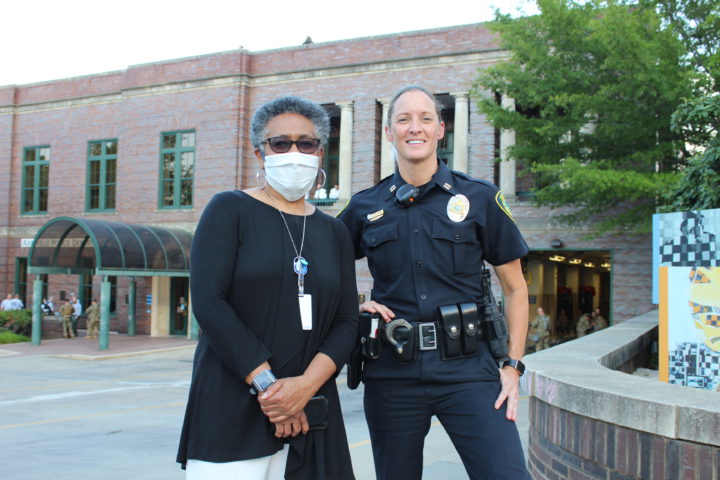If all goes according to plans laid out by Asheville City Manager Debra Campbell and Asheville Police Chief David Zack, the Asheville Police Department will look different come September. Citing a need to address deep distrust within the community, the two announced 30-, 60- and 90-day plans for restructuring the APD during Asheville City Council’s meeting of June 9.
Since May 31, APD officers have fired tear gas and rubber bullets multiple times against peaceful protesters for racial justice, and the department made international headlines for destroying protesters’ medical supplies on June 2, a move widely criticized by local activists and public officials. Zack, whose June 9 address to Council was his first since assuming his position in February, said he’d engaged an outside entity to complete a full after-action report to determine if the APD’s actions during the protests were justified.
Such a report will take substantial time to commission, Zack said. In the interim, he continued, “law enforcement transparency engagement advisors” will arrive in Asheville on June 10 to “keep the public better informed” and begin “providing a better understanding of what took place during the protests.” City officials had not responded to an Xpress request for the APD’s contract with these advisors as of press time.
Shortly before the meeting, Council members Sheneika Smith and Brian Haynes released a statement calling for a separate investigation by Campbell into the APD’s use of tear gas and destruction of medical supplies. The Council members also requested access to officer body camera video from those actions.
“Just because actions may be justified under law does not make those actions necessary,” Zack noted in his presentation. “This will be looked at, and due process will be followed. But I can assure our community that unjustified or unnecessary action will result in the appropriate discipline.”
The Asheville shuffle
Over the next 30 days, Zack said he plans to add new officer behaviors to those flagged by APD’s early intervention system, which helps to “identify and positively influence conduct or performance-related problems exhibited by individual employees” before they lead to larger issues. The chief did not provide examples during the presentation of what those behaviors would be.
Also in the first 30 days, Zack pledged to expand the department’s criteria for reporting the use of force. He would revise APD’s promotional processes to emphasize merit and equity and abolish the Drug Suppression Unit, which he said has placed too much of a focus on low-level drug crimes.
Within the next 60 days, Zack hopes to promote several officers to support him in restructuring the department and will appoint a liaison to the District Attorney’s office to help identify cases where APD officers mishandled the investigation. The department will also implement an anonymous phone tip line for community members to anonymously report crime and officer misconduct.
“Our plans are actions and not words,” Zack said. “We feel our goals are reachable and will define our agency culture moving forward. It is our intent to bring to the residents an Asheville Police Department they can be proud of.”
The most substantive of the proposed changes would come at 90 days and beyond. Zack said the APD would add a community engagement division with the sole purpose to “quickly respond to neighborhood quality of life issues and more complex societal issues, such as substance abuse, homelessness and mental health.”
That division would include a Homeless Outreach Team with full-time officers dedicated to facilitating access to medical, mental health and social service care, Zack added. A new, dedicated Integrity Unit would ensure the APD followed its own policies and procedures through “random and scheduled oversight.”
The proposed changes would not require any additional funding; the police budget is currently slated to increase by roughly $400,000 next fiscal year, with the majority of that money used for state-mandated retirement contributions and vehicle expenses. Instead, explained Zack, existing personnel would be realigned and transferred to different divisions.
Council member Julie Mayfield questioned whether some of the proposed new departments should be housed outside of the APD. “It all sounds like the right direction, but I know that we have a lot of people in the community who would love to have input into your thinking about the restructuring,” she said.
Beyond the blue

Campbell also presented her own 30-, 60- and 90-day plans for city government to address concerns voiced by demonstrators at the downtown protests. The next month, she said, will see leaders work with the community to rename streets that currently honor slaveholders or have unspecified “other negative connotations,” as well as make more data available from the city’s equity and inclusion department.
Within the next 60 days, Campbell said she will continue partnering with the Asheville and Buncombe County school districts to address opportunity gaps, as well as continue community conversations around the city’s budget. Additionally, she said she would initiate conversations with District Attorney Todd Williams to decide if enough time has been allotted for public comment on the probation of Christopher Hickman, the former APD officer who pled guilty to beating black Asheville resident Johnny Rush in 2017.
Campbell’s 90-day objectives include recruiting people of color and developing a race- and gender-conscious policy in response to the city’s 2018 contracting and procurement disparity study. The city will also work to understand other protester demands, including the creation of “harm free zones” and an all-civilian police oversight committee, although Campbell said such initiatives would “be a heavy lift for us.”
Council members, reflecting on the city’s recent challenges, expressed their commitment to leverage the community’s pain into sweeping reform. “Together, I am confident we can rise to the opportunities presented by this moment and I challenge all of us not to squander it,” Mayfield said.
Council member Vijay Kapoor used his remarks to thank APD officers for their work during what “was probably the most difficult week you’ve ever experienced as a police officer.” He asked that officers buy into the suggested reforms not because they have to, but as a “step of reestablishing trust with the community.”
But change doesn’t happen in a vacuum, suggested Council member Keith Young. He asked that any shifts to the city’s work include the explicit input of the black community.
“Simply changing where the money goes does not stop the foundation of a practice that affects the outcomes of whether a black man or woman dies at the hands of police or any other oppressive system that upholds the values put in place over decades, even centuries, to enable all of these negative outcomes,” Young said. “I’m willing to go the distance to see whatever structural change is needed to sustain any fund reallocation or financial support for efforts that seek to uplift a more equitable system.”



Before you comment
The comments section is here to provide a platform for civil dialogue on the issues we face together as a local community. Xpress is committed to offering this platform for all voices, but when the tone of the discussion gets nasty or strays off topic, we believe many people choose not to participate. Xpress editors are determined to moderate comments to ensure a constructive interchange is maintained. All comments judged not to be in keeping with the spirit of civil discourse will be removed and repeat violators will be banned. See here for our terms of service. Thank you for being part of this effort to promote respectful discussion.